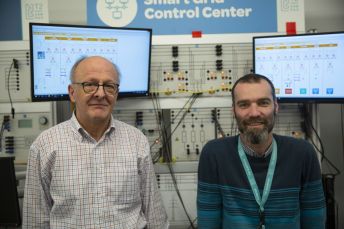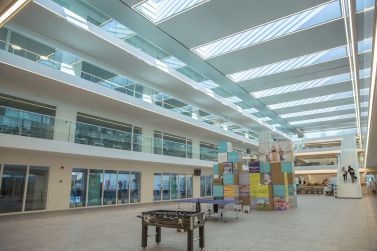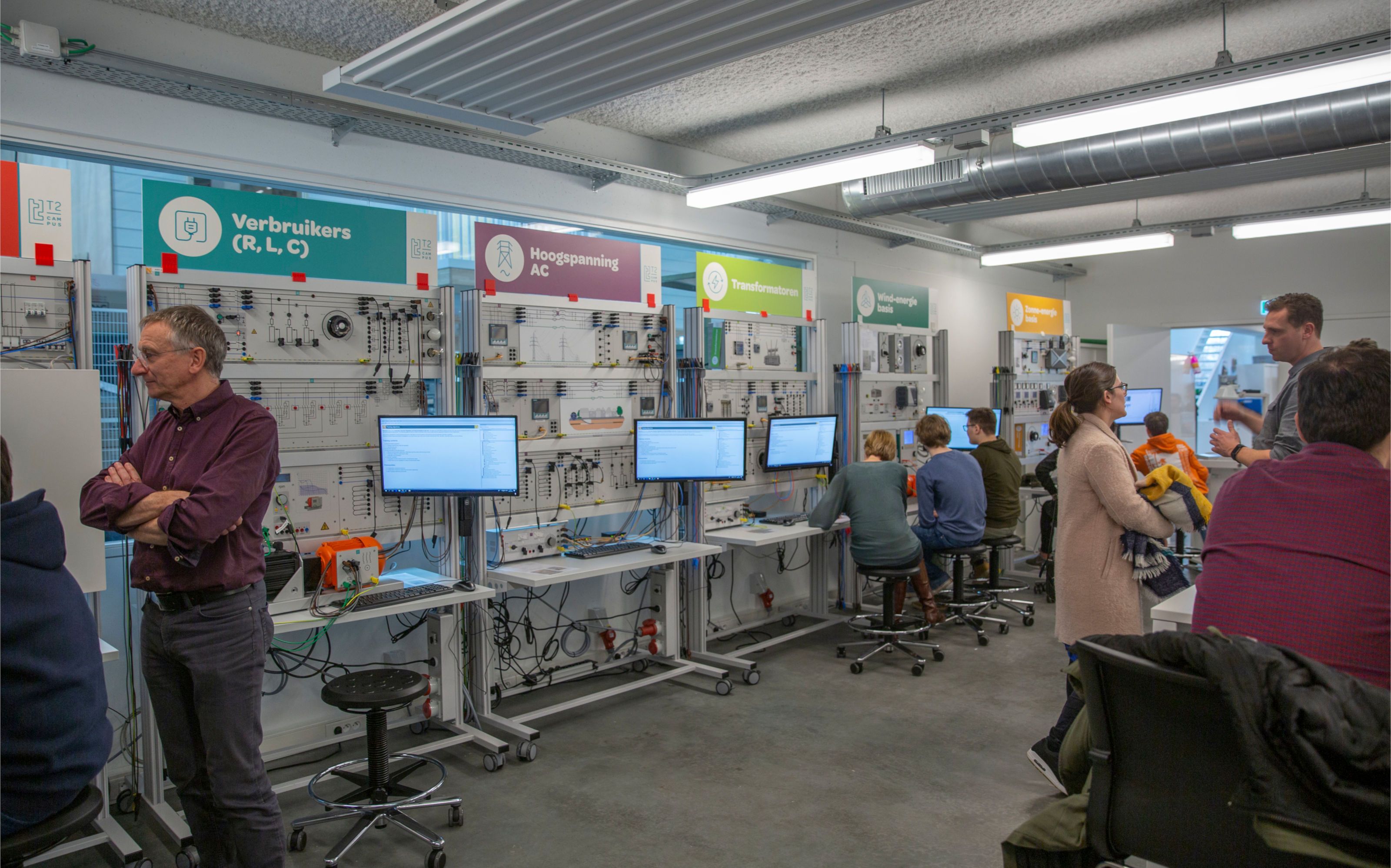A new era of energy generation emerging
At the new T2-Campus in Genk, a motivated team offers technophile students – from schools to universities – power engineering training with Lucas-Nülle.New and old forms of energy generation are found right here together. The T2-Campus in Genk is situated in the Thor Park – a new, regional development project on the site of the former Waterschei mine. An old winding tower serves as an impressive monument to bygone coal-mining times. Today however the steel structure overlooks an area that has transformed into a modern technology, energy and innovation hub. Here the T2-Campus is one of the places offering comprehensive education. In the topic of power engineering training, the planners alongside project developer Andre Jodogne and product innovator Tom Nijsen opted for Lucas-Nülle’s Smart Grid laboratory.
The T2-Campus: a place of learning that reaches beyond boundaries
 Talent and Technology – or short T2 – are the two central elements of the Campus that in turn is an important cornerstone of the park named after the Nordic deity. In an open glass construction, the city of Genk and the regional technical institutes, as well as training providers VDAB and Syntra Limburg, have created a central education and training venue. Here students from technical schools, workers undergoing basic or further vocational training and university students undertaking master’s degree courses meet in the same learning space.
Talent and Technology – or short T2 – are the two central elements of the Campus that in turn is an important cornerstone of the park named after the Nordic deity. In an open glass construction, the city of Genk and the regional technical institutes, as well as training providers VDAB and Syntra Limburg, have created a central education and training venue. Here students from technical schools, workers undergoing basic or further vocational training and university students undertaking master’s degree courses meet in the same learning space.
While the Thor Park as a whole is an expression of the innovative path being taken by a region undergoing structural change, the story at the heart of the T2-Campus is one of successful cooperation in education and training. “We have managed to achieve a new level of quality thanks to three institutions joining forces and combining what was previously six places of learning into a single center,” André Jodogne says. The result has seen the new campus developing into an attractive place of learning that reaches beyond the boundaries of the three institutions.
The Campus relies on Lucas-Nülle for the core topic of energy
Across different institutions based in the industrial park the topic of energy and power engineering is given special focus. One such example is energy research institute “EnergyVille” who calls it home. It is therefore vital that this area is also covered by the T2-Campus. The equipment of the centrally located Lucas-Nülle Smart Grid Laboratory is the hub for the different topics. “In the Smart Grid, users can see how a wide range of electrical engineering and electronics subdisciplines go into making up the overall picture of modern energy management,” says Tom Nijsen, who is primarily responsible for the topic of New Energy here. “The Smart Grid topic is innovative, we can’t get any closer to the real application than by using the equipment of our new Lucas-Nülle appeal of the new systems, “plus the Lucas-Nülle equipment offers in-depth, digital learning content. For us, it means that we don’t have to spend years going through the laborious process of developing this material ourselves.”
Modular design facilitates flexible use
 The Lucas-Nülle Smart Grid Laboratory has several components that allow students to either work on specific topics or learn about the background of flexible grid management. It covers all the topics of power generation, transmission and consumption management. This includes modern technologies such as battery storage equipment, smart metering or renewable energies as well as different transmission lines, conventional types of power stations or pumped storage plants.
The Lucas-Nülle Smart Grid Laboratory has several components that allow students to either work on specific topics or learn about the background of flexible grid management. It covers all the topics of power generation, transmission and consumption management. This includes modern technologies such as battery storage equipment, smart metering or renewable energies as well as different transmission lines, conventional types of power stations or pumped storage plants.
The SCADA Power Engineering Lab Software facilitates intelligent control of the laboratories as well as analysis of the Smart Grid by means of Soft PLC. Working with SCADA in particular makes the hardware attractive for university users too, enhancing the laboratory’s flexibility in how it can be used by learners at the T2-Campus.
Trainers are enthusiastic
In the few weeks since the opening of the laboratory, the local team of instructors has already trained over 100 future trainers on the equipment. The feedback from the various institutes has been very positive. “We had training specialists here who were particularly interested in the role of the individual components within the overall system,” Tom Nijsen says, adding that “the university users, on the other hand, found the simulation of the interaction between all the energy input sources very helpful.”
Technical secondary school students also use the equipment to learn the basics in the field of wind energy or photovoltaics. And in future, too, there will be no shortage of demand. On peak days the new Campus is already visited by over 1,000 students and trainees – and that number is only set to increase.
|
|
